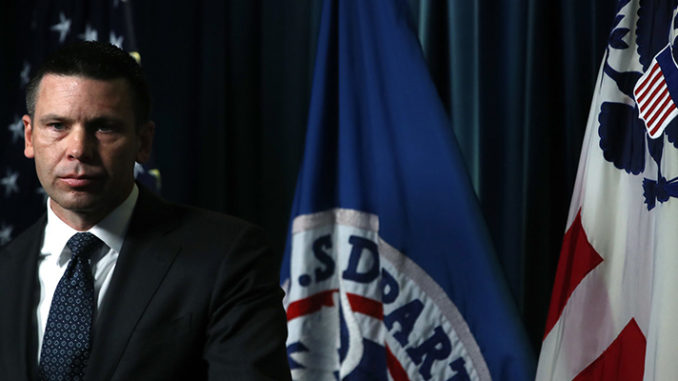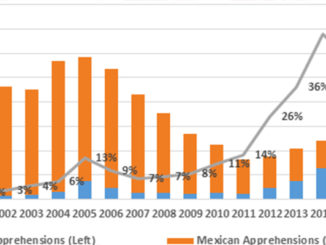
The Department of Homeland Security, about to lose its fourth leader in three years, is a laboratory of Trumpian chaos.
by The Editorial Board, NY Times
Thursday was supposed to be the last day on the job for Kevin McAleenan, the acting secretary of the Department of Homeland Security. The fourth person to head the department under President Trump, Mr. McAleenan tendered his resignation three weeks ago, after a brief, turbulent stint in which he — not infrequently — found himself at odds with the president’s more radical immigration policies, statements and advisers.
In announcing Mr. McAleenan’s impending departure via Twitter, the president congratulated him on “a job well done” and said he would name a new acting secretary the following week. That didn’t happen, threatening to leave rudderless the government’s third-largest department, with a portfolio ranging from border protection to disaster management to transportation safety to counterterrorism to election security. In an appearance before a House committee on Wednesday, Mr. McAleenan said that, if asked, he would stay on until a successor was found. “If necessary,” he said, “I’ll absolutely ensure a smooth transition.”
While noble, this seems overly ambitious. In the Trump administration, little at Homeland Security has gone smoothly, with high turnover, vacancies in key posts and a growing number of “acting” officials running major divisions. At D.H.S., the top jobs being filled in a temporary, unconfirmed capacity include the deputy secretary, the under secretary for management, the head of Immigration and Customs Enforcement, the head of Customs and Border Protection and the head of United States Citizenship and Immigration Services. There has been feuding among senior officials, and lines of authority have become hopelessly tangled.
Mr. Trump has made clear he likes things this way; he can exert greater control over what amounts to glorified temp workers, and he doesn’t have to bother with obtaining the Senate’s approval of his appointees. But it is a lousy way to run a department — especially one so sprawling — fueling instability, eroding morale and draining vital agencies of experienced, competent leaders.
The search for Mr. McAleenan’s replacement has reflected this Trumpian chaos. Some of the candidates being floated are not interested in the job, The Times has reported. Others are regarded as insufficiently hard-line to suit the president’s more hawkish aides.
Two officials seen as top choices are Ken Cuccinelli, the acting director of United States Citizenship and Immigration Services, and Mark Morgan, the acting commissioner of Customs and Border Protection. Mr. Cuccinelli and Mr. Morgan, outspoken immigration hard-liners, might have trouble winning Senate confirmation. This is especially true of Mr. Cuccinelli, who made an enemy of the majority leader, Mitch McConnell of Kentucky, by backing a McConnell challenger in a 2014 Senate primary.
Complicating matters, the White House’s legal counsel initially determined that, under federal law, both men were ineligible to serve in an acting capacity — that is, without confirmation. Undeterred, members of the administration began searching for ways to skirt the law and, according to The Times, believe they’ve found a loophole that would allow the president to name someone first to an “inferior officer” post, then promote the person on up to acting secretary. All without consulting the Senate, of course. In other words, the Trump administration has been exercising its imagination to invent a way to doubly thwart the will of Congress and evade confirmation of an appointee to one of the most important cabinet posts.
The move would most likely face a court challenge. It might also alienate Senate Republicans, who are already warning against such a runaround — especially if Mr. Cuccinelli is involved. “The White House would be well advised to consult with the Senate and senators before they take any decisive action that might be embarrassing to Mr. Cuccinelli or to the White House itself,” Senator John Cornyn of Texas told Politico.
The president never quite clicked with Mr. McAleenan, who previously served as the head of Customs and Border Protection. In slowing the flow of Central American migrants across the United States’ southern border, Mr. McAleenan embraced some of the president’s more aggressive policies. He expanded the program requiring many migrants to remain in Mexico while awaiting their asylum hearings, and he pushed through international deals requiring migrants to apply for asylum in the first country they pass through on their way to the United States.
But Mr. McAleenan pushed back on other measures, such as a plan to conduct mass deportation raids across the country. And he was openly critical of the growing politicization of the department. “What I don’t have control over is the tone, the message, the public face and approach of the department in an increasingly polarized time,” he said in an interview with The Washington Post shortly before his resignation.
The use of divisive or freighted language has been of particular concern to him. “I think the words matter a lot,” he told The Post. “If you alienate half of your audience by your use of your terminology, it’s going to hamper your ability to ever win an argument.”
Mr. Trump’s fifth homeland security chief — if one can be found — is unlikely to harbor any such heretical views.
The Times is committed to publishing a diversity of letters to the editor. We’d like to hear what you think about this or any of our articles. Here are some tips. And here’s our email: [email protected].
The Editorial Board is a group of opinion journalists whose views are informed by expertise,



